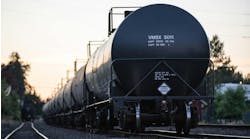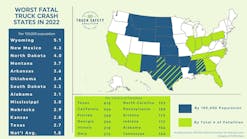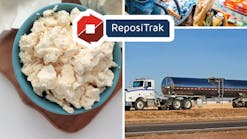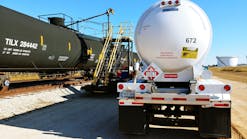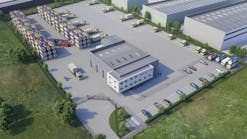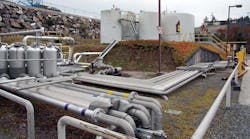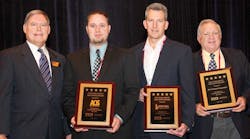API 2611 finally gets published, recognizing that terminals are different from refineries
IN June 1993, the American Petroleum Institute (API) published API 570 (Piping Inspection Code) — a standard developed to reduce the rate of serious incidents in refineries caused by piping failures.
While it targeted primarily refining operations, it was crafted to be generally applicable to any process piping. However, numerous petroleum distribution terminals have not or do not intend to adopt API 570 as part of their piping inspection program.
That's because of differences between the piping-damage mechanisms in refineries and terminals. Refineries must cope with piping subject to temperature extremes, various types of internal and external corrosion caused by a wide variety of chemicals, fatigue cracking, environmental cracking, and accelerated corrosion at injection points. On the other hand, terminal piping is generally low-pressure, ambient temperature, and there are only a few well-defined corrosive environments associated with them. Rather than adopting API 570, most of these terminals use a wide variety of local piping inspection programs.
Finally, after years of research and work by API, they have their own standard. API 2611, which specifically addresses the terminal sector, was published in June.
“This document recognizes that there are different issues associated with bulk terminals,” said Scott Olson, a reliability and integrity engineer for Shell Supply & Distribution North America who served on the API 2611 work group team. Olson spoke during the International Liquid Terminals Association's 31st Annual International Operating Conference in Houston, Texas.
“This document attempts to fill in that gap and give some consistent, fit-for-purpose guidance on those systems,” he said. “It was recognized that there are clean products with not a lot of water in them, and you're at ambient temperatures and fairly low pressures, compared to refineries and pipelines. You don't have a lot of the risks you have at those other locations. Some of the protocols called out in refineries are probably overkill for bulk terminals. I don't want to give the impression there are not any risks in bulk terminals. We need to manage those risks. But some of the really high risks present at these other locations just aren't there at terminals.”
Olson said the biggest remaining question is whether API 2611 is a requirement or just a recommended practice.
“A lot of that depends on the individual company's interpretation of these industry standards,” he said. “It's not required in the Code of Federal Regulations, so you can't say that it's the law that anybody complies with it, but it is an industry practice. That's up to each company's interpretation. Some will determine that it's a requirement and some will not.”
API 2611 covers the inspection of typical terminal piping systems within terminal boundaries, which includes off-plot piping. Off-plot piping includes, but is not limited to piping between facilities, piping that comes from or goes to a refinery, or other type facility, or piping that may cross a road, ditch, or other property outside the confines of a terminal facility.
Piping for transportation of finished fuel products such as gasoline, diesel, lubricating oils, jet fuel and aviation fuel are covered by the scope of this document. Also covered are piping systems for non-fuel-type fluids. The piping for other terminal non-fuel-type fluids typically found in terminals include asphaltic products, process water, transmix, slop water, and biofuels.
The scope of this document does not include piping in a refinery facility, sanitary waste piping, cast iron piping, and nonmetallic gravity flow piping systems.
It addresses the piping and associated failure modes commonly found in terminals with piping systems operating at a maximum process design pressure of 300 psi at ambient temperature (an exception on design temperatures is made for asphaltic products). For asphaltic products, this document covers the maximum process design pressure of 150 psi at a temperature range of 25°F to 450°F.
In general, with regard to non-regulated off-plot piping, the terminal owner/user may elect to base their inspection requirements on API 2611, the more stringent API 570 requirements, a combination of the two, or a combination of selected requirements from API 2611 and API 570 in conjunction with their own set of requirements.
API recommends that regardless of the source, the owner/user should have inspection procedures established, documented, and adhered to for their terminal facilities.
Fluid services that are excluded from the specific requirements of API 2611 include the following: water (including fire-protection systems), steam, steam-condensate, and boiler feed water; oil-water treatment systems and any water downstream of the terminal (oil-water separator piping).
Classes of piping systems that are excluded are as follows: piping systems on movable structures covered by jurisdictional regulations, including piping systems on trucks, ships, barges, and other mobile equipment; piping systems that are an integral part or component of rotating or reciprocating mechanical devices, such as pumps, compressors, turbines, generators, engines, and hydraulic or pneumatic cylinders where the primary design considerations and/or stresses are derived from the functional requirements of the device; internal piping or tubing of fired heaters and boilers, including tubes, tube headers, return bends, external crossovers, and manifolds; pressure vessels, heaters, furnaces, heat exchangers, and other fluid handling or processing equipment, including internal piping and connections for external piping; plumbing, sanitary sewers, process waste sewers, and storm sewers; piping or tubing with an outside diameter not exceeding that of NPS ½; nonmetallic piping and polymeric or glass-lined piping; cryogenic piping systems (such as liquefied natural gas); and piping regulated under USDOT 49 CFR 195.
Olson said inspectors do not require API 2611 certification. He said qualification is to be demonstrated via one of two options:
Option 1
Owner/user to develop qualification scheme based on general parameters: must have adequate experience and training; must have access to, and knowledge of, applicable sections of API 570, 571, 574, and 577; must keep records of inspector qualification for a minimum of 10 years.
Option 2
The following certifications may also serve as 2611 qualification: API 570 (Piping); API 510 (Pressure Vessels); API 653 (Tanks); NB Program NB-215 (Boilers & Vessels); and applicable state-accredited programs. ♦

